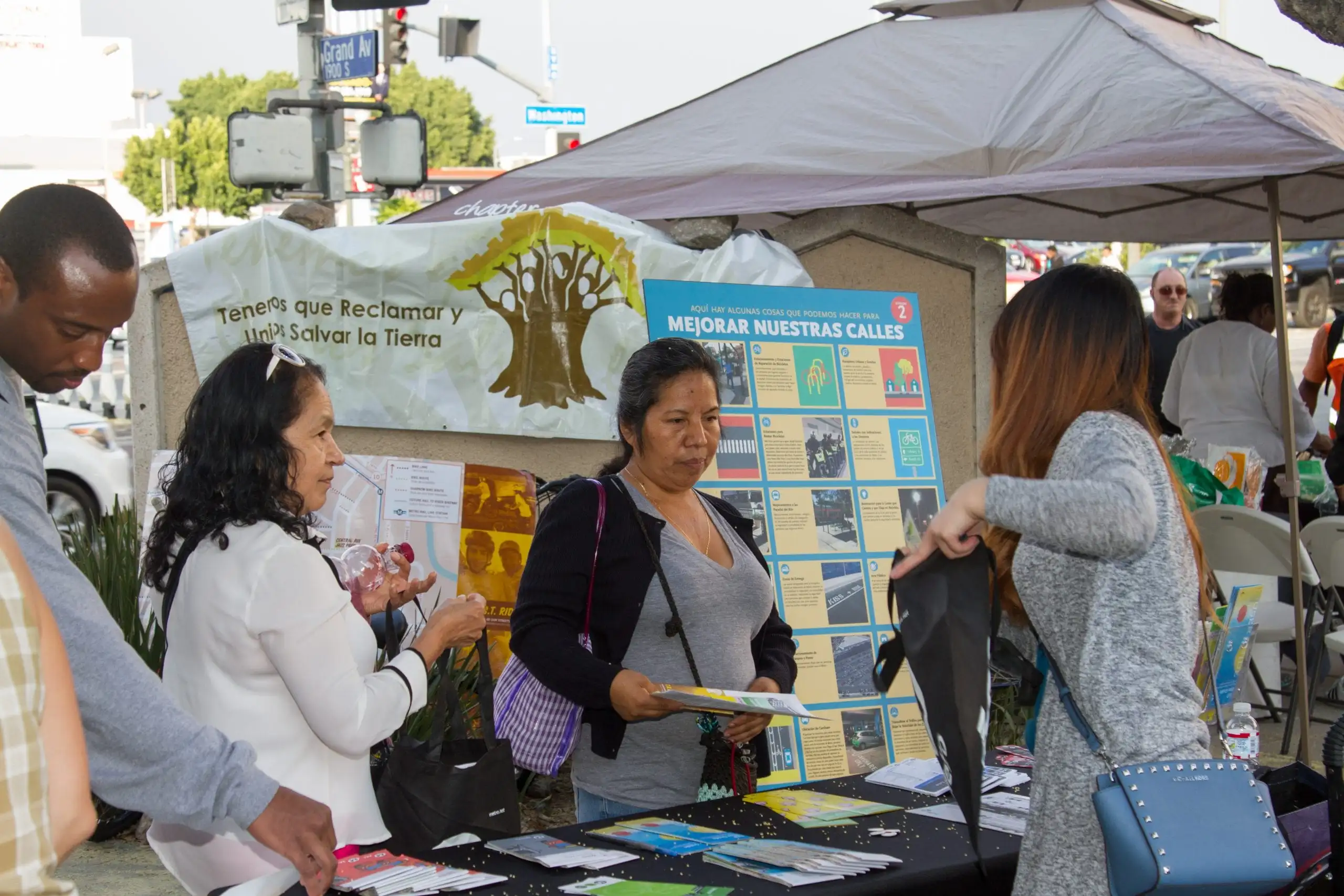
Transit agencies should continually interact with their riders and community members to ensure services meet their needs. Community engagement can take many forms, from agency staff hearing public comments on a finished project to working with constituents to design a plan or policy. Transit agencies often outsource this work to third-party consultants, who can be unfamiliar with the communities they are tasked to engage with.
Since the mid-2010s, LA Metro has been refining a promising engagement method: partnering with community-based organizations (CBOs) on agency projects. This multi-purpose approach braids the perspective of community members into ongoing, essential aspects of LA Metro’s operations, like service planning and policy development.
TransitCenter, Center for Neighborhood Technology (CNT), and six LA-based community organizations worked with LA Metro to implement part of the agency’s strategy for working with CBOs. In our new report, Equity in Practice: Strengthening Transit through Community Partnerships, we reflect on what other agency practitioners can learn about community partnerships from LA Metro.
Community-based organizations work on behalf of neighborhoods, demographic or socioeconomic groups, religious communities, or others with a shared identity by providing a service, advocating on an issue, and more. In addition to professional skills and organizational resources, CBO staff have a wealth of knowledge about and trust with their community members, earned by regularly and directly interacting with them.
These attributes equip CBOs to tackle many of LA Metro’s scopes of work — like collecting and synthesizing data about rider behavior, investigating conditions around a transit project, connecting people to LA Metro’s services, or identifying systemic barriers that prevent access — with a lens on community members’ experiences and needs.
However, agency-CBO partnerships can also present challenges. Government agencies and community-based organizations operate very differently, from decision-making processes to the paperwork required to formalize an agreement. If unaddressed, cultural differences between the organizations can doom a collaboration.
CNT and TransitCenter offered our research expertise and team capacity to the Office of Equity and Race, to aid their implementation of the CBO Partnering Strategy. Our cross-organizational team developed two recommendations from the strategy: a database connecting CBO and LA Metro staff to information about each other and partnership opportunities and a charter process to guide LA Metro-CBO partnerships.
This report describes how we developed those two recommendations. In doing so, it demonstrates the process and form that community-driven agency programs can take and illuminates lessons about CBO-agency relationships.
The report is a follow-up to our 2021 report, Equity in Practice, which lays out equity best practices for the transit industry.
Here are some of our key takeaways from our new report:
- LA Metro has an existing infrastructure on equity and community-focused work that has prepared it to adopt new tactics. The Equity Platform defines the overarching purpose for transforming the agency’s approach to community partnerships, and the CBO Partnering Strategy identifies specific process steps to accomplish this goal. The Office of Equity and Race is responsible for operationalizing these strategies.
- This infrastructure proves LA Metro’s commitment to the work, which had the practical effect of motivating CBO and agency stakeholders to engage in the implementation process.
- Our project process made time and resources available for trust-building, extensive user input, and iterative improvements to our deliverables. We designed these with multiple input stages from their key users, CBO, and LA Metro staff. In addition to ensuring users’ needs were met, the extensive user-driven design phase built buy-in from key users.
- Generous time and personnel resources were essential to our approach. Our core team included five staff members from CNT, TransitCenter, and LA Metro. The team met every two weeks for over 18 months to discuss the research plan, process our findings, and coordinate the next steps.
- We hired six community-based organizations to contribute to the research by bringing in the CBO user perspective. Compensation secured their staff time and signaled that their contributions were valued.
- CNT and TransitCenter’s roles as neutral, third-party researchers gave LA Metro and CBO users the space to be honest about their past experiences and future goals for community partnerships.
- Our experience identified additional policies and tactics that LA Metro could adopt to strengthen CBO-agency partnerships.
Resources
The Office of Equity and Race and partner teams at LA Metro continue to develop resources and programs to further LA Metro staff’s capacity to work with CBOs on project work.
They include the CBO database, the charter process, a series of trainings for staff (think: “Working with CBOs 101”), equity assessment tools, a tracking form designed to document LA Metro teams’ process of selecting CBOs, a checklist of procedures and documents required to initiate CBO partnerships, a wiki page as a go-to reference for CBO engagement, and the Equity Information Hub – a centralized site for many of the resources listed above.
Here are links to LA Metro’s publicly available resources for CBO-agency partnerships.
- LA Metro Equity Platform
- LA Metro Community-Based Organization Partnering Strategy
- LA Metro Office of Equity and Race
- CBO database
- CBO Charter process draft template
- Project charter facilitators guide (pages 38-39)
- Equity Assessment Tools
- Equity Information Hub
- CBO Partnership Considerations Checklist